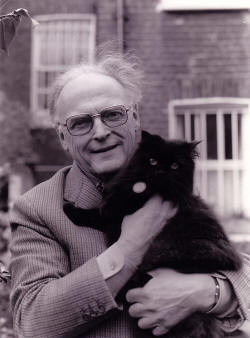Partner Dave Atkin,
Deham Abdelkrim
Queer Places:
University of Oxford, Oxford, Oxfordshire OX1 3PA
 Francis Henry King CBE (4 March 1923 – 3 July 2011)[1] was a British novelist and short story writer. He worked for the British Council for 15 years, with positions in Europe and Japan. For 25 years he was a chief book reviewer for the Sunday Telegraph, and for 10 years its theatre critic.[2]
King came out as homosexual in the 1970s. After his long-term partner, actor
Dave Atkin, had died from AIDS in 1988, he described their relationship in Yesterday Came Suddenly (1993).
Francis Henry King CBE (4 March 1923 – 3 July 2011)[1] was a British novelist and short story writer. He worked for the British Council for 15 years, with positions in Europe and Japan. For 25 years he was a chief book reviewer for the Sunday Telegraph, and for 10 years its theatre critic.[2]
King came out as homosexual in the 1970s. After his long-term partner, actor
Dave Atkin, had died from AIDS in 1988, he described their relationship in Yesterday Came Suddenly (1993).
King was born on 4 March 1923 in Adelboden, Switzerland, to a father in the Indian Civil Service, brought up in British India and sent back to England when his father was dying. As a boy, he was shunted around among aunts and uncles.
He was educated at Shrewsbury School and Balliol College, Oxford. During the Second World War he was a conscientious objector and left Oxford to work on the land.[3]
After completing his degree in 1949, King worked for the British Council. His positions with them took him to Italy, Salonika, and finally Kyoto. While he was in Greece he met the uninhibited writer Anne Cumming, who was also working for the British Council. She enjoyed observing his homosexual adventures.[4] In 1964 he resigned to write full-time, by when he had already published nine novels, as well as poetry and a memoir.
He won the W. Somerset Maugham Prize for his novel The Dividing Stream (1951)[5] and also won the
Katherine Mansfield Short
Story Prize. In 2000, he was awarded the Golden PEN Award by English PEN for
"a Lifetime's Distinguished Service to Literature".[6] His 1956 book The
Firewalkers was published pseudonymously under the name Frank Cauldwell.
When he was living in Brighton in the 1960s he fell unrequitedly in love with a Greek called Giorgio; the agonies he suffered are minutely and movingly analysed in A Domestic Animal, one of his best novels. Giorgio did not mind, but another character in the book did. This was the former MP Tom Skeffington-Lodge, whom King had prudently made a woman in the book; but Skeffington-Lodge recognised the caricature all the same, and started proceedings which practically beggared King. He had to rewrite the novel, with Skeffington-Lodge becoming more and more exigent in his demands for successive redrafts. The story, sufficiently fictionalised to put it beyond the reach of lawyers, was told in a later novel, The Action, which many think King’s funniest.
In the 1960s, before he moved from Brighton to London, he met the actor
David Atkin and shared with him an almost idyllic happiness till the latter’s death in 1988. King wrote strongly in defence of the homosexual lifestyle and against the popular idea that gays were promiscuous and incapable of lasting relationships.
From 1986 to 1989 he was President of PEN International, the worldwide
association of writers and oldest human rights organisation. He was a Fellow
of the Royal Society of Literature, and was appointed an Officer (OBE) of the
Order of the British Empire in 1979 and a Commander of the Order (CBE) in
1985.[1] In 2003, his novel The Nick of Time was long-listed for the Man
Booker Prize.
King suffered a stroke in 2005. Francis King died on 3 July 2011 at the age of 88.[2] His civil partner,
Deham Abdelkrim, survived him.
My published books:


BACK TO HOME PAGE

 Francis Henry King CBE (4 March 1923 – 3 July 2011)[1] was a British novelist and short story writer. He worked for the British Council for 15 years, with positions in Europe and Japan. For 25 years he was a chief book reviewer for the Sunday Telegraph, and for 10 years its theatre critic.[2]
King came out as homosexual in the 1970s. After his long-term partner, actor
Dave Atkin, had died from AIDS in 1988, he described their relationship in Yesterday Came Suddenly (1993).
Francis Henry King CBE (4 March 1923 – 3 July 2011)[1] was a British novelist and short story writer. He worked for the British Council for 15 years, with positions in Europe and Japan. For 25 years he was a chief book reviewer for the Sunday Telegraph, and for 10 years its theatre critic.[2]
King came out as homosexual in the 1970s. After his long-term partner, actor
Dave Atkin, had died from AIDS in 1988, he described their relationship in Yesterday Came Suddenly (1993).
